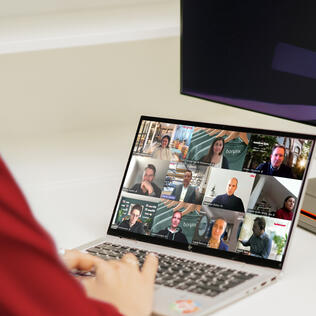Mastering AI in Retail: GEO Strategies for E-Commerce Leaders

A recent study by OpenAI1 reveals that about 2.1 percent of 18 billion weekly queries worldwide are already related to products and shopping. This significant global usage underscores an undeniable imperative for retailers to adapt to the seismic shift in e-commerce, driven by Generative AI (GenAI) and the emerging field of Generative Engine Optimization (GEO). This article explores why these concepts are critical and how they are reshaping consumer product discovery and purchasing. A closer look at what this transformation means in practice.
As market dynamics accelerate, startups often function as innovation motors, rapidly adapting to new developments. This is precisely why the Otto Group remains firmly committed to its long-standing corporate venturing activities, including its anchor investment in Project A – the venture capital fund from which A11 emerged. This powerful network enables crucial knowledge transfer, keeping us at the pulse of change. In this context, GEO is the critical new discipline focused on adapting digital content and online presence to improve visibility and ensure brands are cited or recommended in results produced by GenAI platforms.
In this exclusive interview, Alexandre Schmitz, Senior Growth Marketing Consultant and GEO lead at A11, shares his expertise on why retailers can no longer afford to delay GEO implementation, detailing GenAI's immediate impact on everything from customer search behavior to competitive dynamics, and providing actionable strategies for businesses to adapt now.
What is the overarching impact of GenAI on the e-commerce landscape? And why is it imperative for retailers to actively adapt their strategies now?Alexandre Schmitz: The rise of Generative AI marks a fundamental shift across many industries, especially for e-commerce. It's profoundly changing how customers discover and evaluate products online.
- Key Impact 1: Evolving Customer Search Behavior & Contextual Commerce. Customer search behavior is rapidly evolving. We're observing customers using much longer, more specific queries, expecting highly personalized answers. For instance, instead of searching for "running shoes size 42," data shows customers are now asking questions like, "What's the best running shoe for someone with flat feet who runs five kilometers daily?" This increased specificity means brands must move beyond keyword optimization towards a recommendation-based approach. Data2 indicates that about 60% of customers are already conducting product research using AI tools specifically for online shopping.
- Key Impact 2: E-commerce Funnel Compression & Hyper-Efficiency. Another significant implication is the compression of the e-commerce funnel. AI now provides comprehensive product comparisons, summarizes reviews, and offers highly specific recommendations after just one interaction. This means many traditional touchpoints – such as lengthy Google searches for example – are becoming much shorter. Data3 shows visitors referred from AI tools convert similarly to those from traditional search but are far more engaged, exhibiting lower bounce rates and viewing more pages. This suggests AI-referred traffic is more qualified, as AI handles much of the initial education phase.
- Key Impact 3: Redefined Visibility & GEO as the New SEO for AI. Furthermore, research indicates that only about 4.5%4 of domains cited and recommended by AI overviews align with page one Google results – although this number fluctuates quite a lot as AI ranking algorithms evolve. This means strong SEO alone won't guarantee visibility in AI. AI tools analyze a much broader range of sources, allowing smaller brands to compete more effectively against larger brands if their websites are optimized for AI and their overall online presence is strong and consistent, even without top traditional search rankings.
The direction is clear: consumers want curated recommendations, and they want them today.
What would you tell companies that say: "I'm not quite sure about this GEO thing; I will just wait a bit longer until it's clearer where this whole AI (r)evolution is going?"
Alexandre Schmitz: Waiting and watching is no longer a viable option. We're already seeing brands, especially in e-commerce, experiencing significant organic traffic drops – anywhere from 15% to 30% – since AI overviews launched. Companies that are moving early and optimizing their websites and online presence for GEO are already gaining market and recommendation share within AI engines.
For e-commerce specifically, product discovery habits are changing much faster than general search. Consumers are less likely to browse individual product pages if AI provides curated recommendations. The direction is clear: consumers want curated recommendations, and they want them today.
The competitive landscape within AI search engines is also quite fierce. In traditional SEO, you might compete against 10 to 15 brands on Google's first page. In AI recommendations, you're often competing against only three to five cited sources – at least for now. The selection criteria aren’t just about keywords; it's about building an authoritative and trustworthy brand online with excellent reviews. Companies that began optimizing for GEO six to eight months ago see 30 to 40% more citations for their product categories. This window for early wins is slowly closing. If companies wait 18 months or more, they'll be competing with established brands in a much more mature AI environment. For e-commerce, this means it will be significantly harder to fight for market share, and you will likely lose revenue by delaying.
What are your three very hands-on GEO tips that will help retailers to prominently position themselves and their products on AI platforms?
I am happy to offer three hands-on strategies specifically for e-commerce:
- Create Comprehensive Buying Guides: Develop extensive buying guides on your website that position your products as expert choices. Focus on content like "The Complete Guide to Choosing Running Shoes by Foot Type" or "Best Kitchen Appliances for Small Apartments Under 500 Euros." AI tools particularly favor digestible content formats such as comparison tables that highlight your products as top recommendations, decision trees, listicles, or detailed use-case recommendations.
- Optimize for Shopping Intent Questions: Shift your focus from optimizing for general keywords to answering very specific shopping intent questions. For example, instead of targeting "photography camera," aim at answering "What camera should I buy for my teenager who loves photography?" To uncover these specific questions, leverage customer service logs, social listening, product reviews, and support tickets to create hyper-specific content. These insights are invaluable for creating hyper-specific content around the actual problems and questions customers have.
- Build Systematic Product Authority Across the Retail Ecosystem: This involves ensuring your brand and products are mentioned and reviewed outside your own website. Get your products featured on shopping comparison sites, in expert reviews (from prominent or niche bloggers), industry buying guides, and other retail publications. AI looks for consensus across multiple sources as a signal of trustworthiness. Therefore, a strong, positive presence across the broader retail ecosystem is crucial.
Additionally, it's important to understand that you shouldn't try to optimize for every AI platform. Research shows that the overlap of cited domains between different AI tools, like ChatGPT and Perplexity, can be as low as 10 to 11%5. This means optimizing for one platform doesn't guarantee visibility on another and the recent launch of Google AI Mode in Germany could drastically change the landscape again. Instead, analyze where your customers are and which devices they use. For example, if your target audience primarily shops on mobile, focusing on an AI platform with a higher mobile user share, like ChatGPT, might be more effective than one predominantly used on desktop, like Perplexity.
Thank you for sharing your GEO expertise, Alexandre!
About the Expert

Alexandre Schmitz is Senior Growth Marketing Consultant and leading Generative Engine Optimization (GEO) at A11. In his role, he helps clients lay the right marketing foundations to scale efficiently. His focus is on driving growth through performance marketing and organic content strategies.
A11 is the SWAT team behind some of Europe’s fastest-scaling companies such as Trade Republic and Sennder. Born from Project A’s operational arm, A11 partners with scale-ups and SMEs to accelerate growth and transformation across marketing, data, technology, and talent.
Since 2012, the Otto Group has been an anchor investor in Project A, a leading operational venture capital fund for European startups. Further Corporate Venturing activities include investments in Headline, Revent VC and Norrsken VC as well as our in-house venture client unit Otto Dock 6.
The Otto Group's Proactive Engagement with GEO
As an industry leader, the Otto Group is not only observing these seismic shifts but actively shaping its response to the emerging landscape of Generative AI Optimization. Here's how our experts are driving GEO implementation within the group:
Jan Woelk, Senior SEO Manager at OTTO, on leveraging existing expertise and developing new metrics:
"We are closely following developments in LLMs and GEO. We leverage our long-standing SEO expertise as a foundation and are assessing which measures should be prioritized for GEO. Simultaneously, we are working on developing new KPIs to make performance in the GEO context more measurable and to expand our strategies accordingly. Our goal is to optimally utilize the opportunities presented by LLMs and further expand our visibility in e-commerce."
Sonja Annegret Koehnke, Head of Product Management at Otto Group One.O, on strategic integration and knowledge transfer within the Otto Group:
“Otto Group One.O has been integrating GEO into the development of innovative solutions, particularly AI assistants, for some time now. This includes considering interfaces and protocols that can also be used by GPAs (Generative Pre-trained Agents) for agent-to-agent communication.”
Additionally, the Otto Group Tech Strategy has developed a GEO Playbook that sets the strategic framework for the entire Otto Group. One.O primarily utilizes its expertise in Knowledge Management to foster group-wide exchange and make new insights and developments quickly available across all companies. Furthermore, the company builds technical competence to advise and operationally support the group companies as needed. In this way, One.O significantly contributes to driving the implementation of GEO within the Otto Group.
Sources:
- Aaron Chatterji, Tom Cunningham, David Deming, Zoe Hitzig, Christopher Ong, Carl Shan & Kavin Wadman from OpenAI, Duke University and Havard University: “How People Use ChatGPT“, published on September 15, 2025: https://cdn.openai.com/pdf/a253471f-8260-40c6-a2cc-aa93fe9f142e/economic-research-chatgpt-usage-paper.pdf
- Survey by Bloomreach among more than 1,000 US consumers about shopping in the age of AI, published on March 15, 2025: https://www.bloomreach.com/en/news/2025/bloomreach-announces-findings-from-conversational-ai-shopping-study/
- Survey by Adobe among US consumers conducted in September 2024 and February, published on March 23, 2025: https://business.adobe.com/blog/the-explosive-rise-of-generative-ai-referral-traffic
- Case Study by Arc Intermedia “Impact of AI Search on User Behavior & CTR in 2025“, published on Oct 6, 2025: https://www.arcintermedia.com/shoptalk/case-study-impact-of-ai-search-on-user-behavior-ctr-in-2025/
- Analysis by AI visibility tracking company Profound, published by Josh Blsykal in July 2025 on LinkedIn: https://www.linkedin.com/posts/joshua-blyskal_i-analyzed-100k-prompts-across-chatgpt-and-activity-7345819232120565760-NVx6?utm_source=share&utm_medium=member_desktop&rcm=ACoAAAvBwAsBSi9z05teP48I_eJNIVssLJ_-kYo





